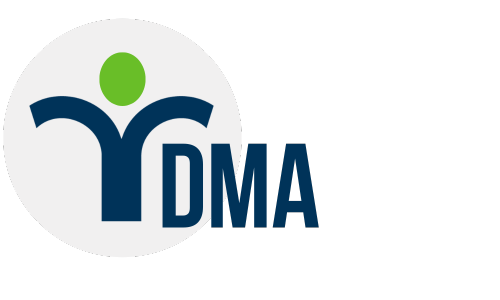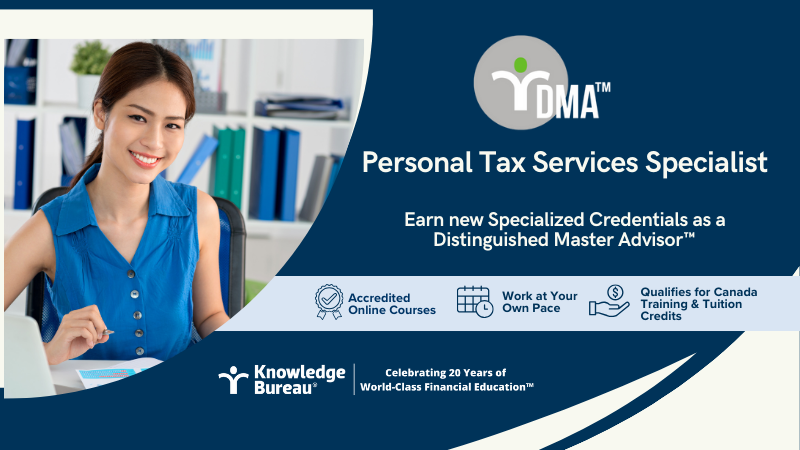Income Tax Courses: Add High Value to Your Services

The April 16 Federal Budget proved once more that one of the most important skills people working in the financial services can offer is a deepened knowledge of personal, corporate and trust filing requirements. This is an essential financial service to help households navigate the increasingly broad – and expensive - reach of the CRA, especially for investors and business owners. Knowledge Bureau’s suite of newly updated certificate tax, bookkeeping and retirement planning courses are now available online, together with a special offer. Course benefits and descriptions follow:
Knowledge Bureau’s certificate courses are organized into five areas of specialization leading to the DMA™ (Distinguished Master Advisor) designation. There are six courses in each full program:
The Personal Tax Services Specialist Program: With new, deepened knowledge students will first understand their own family’s tax preparation and planning solutions better and save you money on family tax preparation cost. Students have up to 3 months to complete each course (approximately 30-40 hours each), but most students can graduate sooner.
Course 1 Introduction to Personal Income Tax. This course will teach fundamental skills required to file returns for five taxpayer profiles: low income credit filing, filing returns for employees, families with children, investors, and seniors. You will practice on student versions of professional tax software and prepare “what if” planning scenarios to build confidence and save your clients money with important investment options like RRSP, FHSA and TFSA planning.
An open book approach is great for learning. It helped me to go back and review the materials over again so that I could get the right answers on the quiz but it also provided a good understanding of all the material. I think this course has been very helpful and will enable me to start my first year of T1s with my company in a much more effective way. —Bryce W, Alberta
Course 2 Professional Income Tax Filing – Advanced. This course delves more deeply into the deductions, tax credits, and tax calculations on the personal tax return, with an emphasis on the returns filed by investors including their capital gains and losses, and registered and non-registered investment income sources.
“I loved the course setup. I could work at my own pace and I could print off the assignments. This course, unlike other courses, did not treat me like a child by expecting an assignment each week. This course just gave me a deadline for completion and allowed me to work as quickly or as slowly as I deemed necessary.” Robert J. S., Manitoba
Course 3 Filing Proprietorship Returns. Learn how to prepare tax returns for unincorporated small business owners. This involves filing income and expense statements as well as Capital Cost Allowance, Auto and Home Office statements to support net income calculations subject to personal tax and Canada Pension Plan contributions. Learn about claiming business income, GST/HST, business expenses, inventory control, cost of goods sold, writing off wage costs in hiring staff and family members, disposing of and replacing a small business venture and special nuances in filing for farmers, fishers, partnerships and professionals.
“This course includes a tremendous amount of useful information . . . My objective was to learn how to prepare tax returns for small proprietorships, in order to expand my practice. In addition, I do bookkeeping for small businesses and was keen on gaining a better understanding of tax requirements, so that I could be a better bookkeeper. I have acquired a wealth of knowledge and feel a lot more confident about the services I am offering to my clients”. —Sylvie G., YT
Course 4 Filing T3 Returns. This course introduces the types of trust that may be created in Canada and how each of them is taxed. You will learn how to prepare T3 returns as part of the case study exercises in the course. Case studies include the filing of trust returns, slips, and slip summaries for trusts. Students learn how to optimize taxes payable on income earned by a trust by choosing to pay the taxes through the trust or allocating income to beneficiaries and having them pay the taxes.
Course 5 Filing Final Returns at Death. This course deals comprehensively with the taxation of individuals at death. The student will gain a thorough understanding of how income, in particular, capital gains on a deemed disposition are taxed, and how to potentially minimize those taxes, especially in light of new capital gains taxation proposals in the April 16, 2024 Federal Budget. Chapters also include the reporting of income registered accounts, in particular to maximize options for last surviving spouses, claiming deductions, refundable and non-refundable tax credits, dealing with the estate and avoiding probate. You’ll have the ability to prepare all possible T1 returns in the year of death and identify opportunities for probate avoidance, as applicable in high probate jurisdictions.
“Everything so far has had value to it. These studies have added to my knowledge and skills and I have put this knowledge to use immediately for our clients or I gained new skills which has given me the opportunity to expand our services.” – W.Samplonius, ON
Course 6 Introduction to Trusts The student will learn about basic trust mechanics, being able to distinguish the key parties to a trust, the legal status a trust enjoys, how to use trusts to exert control, and most important, how the new rules around bare trust filings and capital gains inclusion rates will impact trust structures. Through case studies, you will demonstrate the ability to identify client situations where income tax savings can be generated. This course allows advisors to develop a consistent process for trust planning that looks at tax efficiency of many different kinds of trusts (bare trusts, inter vivos, charitable remainder, Alter Ego and joint partner, insurance and RRSP, spousal trusts as well as trusts for disabled beneficiaries) and provide alternatives to trust structures in tax and estate planning as well.
“It is important that we are proactive in terms of planning our clients’ affairs. Knowledge Bureau continues to provide me with relevant knowledge and strategies to help my clients navigate through the complex world of finance, life and taxation.” George D, ON
Fees and Funding. Tuition fees are $895 per course plus taxes (with VIP reductions for Knowledge Bureau graduates) and all course materials, research library, testing, certification and instructor support is included. Taken as a full designation program, savings up to 25% can be achieved. Tuition fees qualify for a tuition fee tax credit and for most students, a refundable Canada Training Credit, which provides a refund of up to 50% of tuition fees.